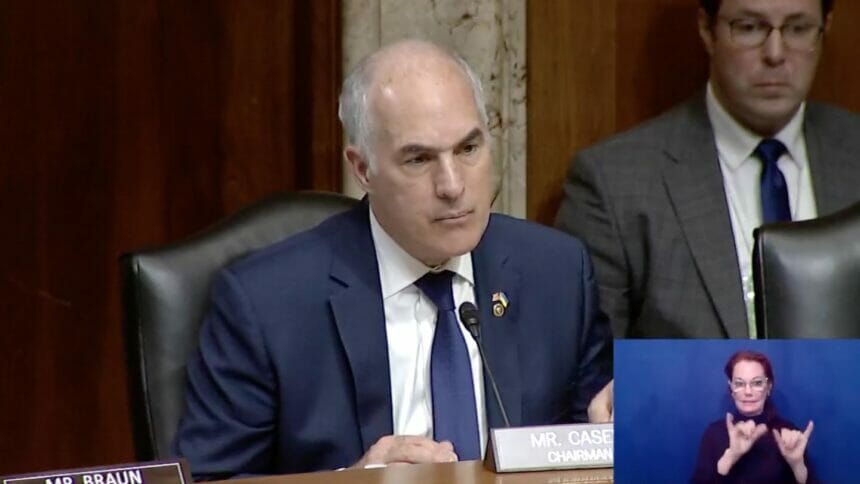
Oversight of the nation’s 15,000-plus nursing homes is “in crisis,” with many facilities more than a year overdue for routine inspections and nine states reporting more than half their surveyor positions are unfilled, senators said Thursday as they released a scathing report on the issue.
“Underfunded and understaffed, state agencies have fallen behind on the basic duties that they’re charged with executing on, for example, conducting annual nursing home inspections and responding to resident complaints in a timely manner,” said Sen. Bob Casey (D-PA), chairman of the Special Committee on Aging. “Nursing home residents are at risk because of this problem.”
In his opening remarks, Casey outlined staggering findings from a year-long investigation in which the committee gathered 2,000 pages of documents and data on survey lapses. Casey said one of every nine nursing homes in the US had not had an annual survey in two years.
He released a report in conjunction with Thursday’s hearing; “Uninspected and Neglected,” found that 32 survey agencies have vacancy rates of 20% or higher among nursing home surveyors. The highest vacancy rates were in Kentucky (83%), Alabama (80%) and Idaho (71%).
Casey placed much of the blame on Congress and its willingness to “flatline” funding for oversight, noting that the report should be a wake-up call to increase support for survey and inspection activities around the country.
Overall, the federal government spends 80 cents per resident per day on nursing oversight, Casey said.
Witness Shelly Williamson, board president for the Association of Health Facility Survey Agencies and administrator of long-term care regulation for the state of Missouri, testified that, nationally, Immediate Jeopardy complaints had risen 102% since 2015. In that time, there’d been no additional national funding to support the uptick in required inspections.
“Survey agencies are reacting to alleged non compliance rather than being proactive by conducting recertification surveys,” Williamson said.
She added that vacancies had compounded the problem, noting that the often thankless and tiring work was already challenging to recruit for. But amid the national nurse shortage, 80% of the nursing home survey agency now say the pay they offer for RN salaries is not competitive with the local healthcare market, Williamson said.
“Simply put, federal dollars are not keeping up with growing workloads and the need to offer competitive salaries to attract workers,” Casey added.
In 2020, Casey secured a one-time, $100 million funding boost for nursing home oversight in the Coronavirus Aid, Relief, and Economic Security (CARES) Act. That is set to expire in September, and 32 states and Puerto Rico reported concern that the loss of those funds will have a negative impact on their ability to complete their work.
In April, Casey and Sen. Ron Wyden (D-OR) urged the Senate Appropriations Committee to add $566 million in funding to CMS’s Survey and Certification program, which was supported in President Biden’s FY 2024 budget proposal.
But after the hearing, the American Health Care Association pushed back against the idea that more enforcement was the best or only way to improve patient care. While the organization shares concerns about the survey backlog, Holly Harmon, AHCA’s senior vice president of quality, regulatory, and clinical services, pointed out that nursing homes are facing the same issues hiring staff that the survey groups do.
“Addressing this labor crisis requires significant investments, not mandates,” Harmon said, referring to the White House’s planned nursing home staffing minimum, a measure Casey has supported. “We need a concerted, supportive effort to help recruit more individuals to serve our nation’s seniors, and we have proposed a comprehensive set of policies that would help grow and strengthen the nursing home workforce.”
Harmon also said the post-pandemic survey environment could be transformed into one that becomes more resident-driven, more consistent and more effective.
“We need to focus on the science of quality improvement by recognizing good faith efforts, leveraging continuous learning, and effectively remedying identified issues,” she said. “Enforcement alone will not transform America’s nursing homes. If we truly want to improve care, then we need policymakers to prioritize, support, and invest in our nation’s most vulnerable and their caregivers.”




